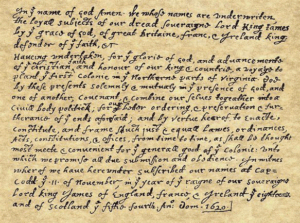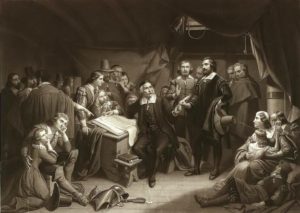With the 400th anniversary of the arrival of the Pilgrims a little more than a year away, it is important to demonstrate the ideological roots of covenant that they expressed in the Mayflower Compact as well as the consistent preaching on Biblical covenant by the clergy in the colonies that resulted in the Declaration of Independence 156 years later. The foundational documents of religious and civil liberty in America are rooted in Biblical covenant and these ideas have been emulated by nations around the globe.
 This understanding of Biblical covenant was once honored in America and Mayflower
This understanding of Biblical covenant was once honored in America and Mayflower  Compact Day annually helped all Americans remember these ideas on November 21 (the new style date adjusted from the original November 11). The Compact was signed on board the Mayflower while it lay anchored in what is now Provincetown Harbor in 1620. A compact is a covenant, and it was God that initiated the concept of covenant in the Bible. Throughout the Bible covenants were used both vertically (with God) and horizontally (with others) to depict the process of bringing people into unity with God and one another. Unity of purpose and harmony set the highest ideals for good behavior.
Compact Day annually helped all Americans remember these ideas on November 21 (the new style date adjusted from the original November 11). The Compact was signed on board the Mayflower while it lay anchored in what is now Provincetown Harbor in 1620. A compact is a covenant, and it was God that initiated the concept of covenant in the Bible. Throughout the Bible covenants were used both vertically (with God) and horizontally (with others) to depict the process of bringing people into unity with God and one another. Unity of purpose and harmony set the highest ideals for good behavior.
The Pilgrims, while they were meeting secretly at Scrooby Manor in England (1606), ratified their church covenant as described by Bradford: “They shook off this yoke of antichristian bondage, and as the Lord’s free people joined themselves (by a covenant of the Lord) into a church estate, in the fellowship of the gospel, to walk in all His ways made known, or to be made known unto them, according to their best endeavors, whatsoever it should cost them.” This church covenant, drawn up by themselves as instructed in the Bible, became the precursor to all other covenants.
Pastor John Robinson had anticipated the need for his church to create a civil government in the new world and had given his advice in his farewell letter upon their departure in July of 1620. “Whereas you are become a body politic, using amongst yourselves civil government, and are not furnished with any persons of special eminency above the rest, to be chosen by you into office of government; let your wisdom and godliness appear, not only in choosing such persons as do entirely love and will promote the common good… not being like the foolish multitude who more honor the gay coat than either the virtuous mind of the man, or glorious ordinance of the Lord.”
 When realizing that they had been blown off course and were not within the boundaries of their Charter, and in the midst of some who threatened mutiny, they drew up the Mayflower Compact. In other words, they formed a new government without express permission from the King! There, off the coast of what is now Provincetown, the cornerstone of American government was born. The inspiration for this civil document was their Pastor, John Robinson! The ideas contained within the Mayflower Compact are significant and foreshadow the Declaration that was to come 156 years later.
When realizing that they had been blown off course and were not within the boundaries of their Charter, and in the midst of some who threatened mutiny, they drew up the Mayflower Compact. In other words, they formed a new government without express permission from the King! There, off the coast of what is now Provincetown, the cornerstone of American government was born. The inspiration for this civil document was their Pastor, John Robinson! The ideas contained within the Mayflower Compact are significant and foreshadow the Declaration that was to come 156 years later.
The idea of voluntary self-government from the “bottom up” was expressed in 1649 under Cromwell and then again 1689 when the Glorious Revolution brought William and Mary to the throne under its Bill of Rights. At the same time, a local pastor, John Wise of Ipswich, was preaching that God had given individuals the right to form their own government and thus he authored, with Cotton Mather, a “declaration of independence” for Ipswich in 1689 against the autocratic rule of Governor Andros.
 The self-government begun by the Pilgrims, in concert with ratifying covenants among the people for civil government set a precedent throughout the colonies and became topics for preaching by colonial clergy. Pastor Wise’s book on church government, written in 1717 became the inspiration for the Declaration more than 50 years later (being republished by Sam Adams in 1772).
The self-government begun by the Pilgrims, in concert with ratifying covenants among the people for civil government set a precedent throughout the colonies and became topics for preaching by colonial clergy. Pastor Wise’s book on church government, written in 1717 became the inspiration for the Declaration more than 50 years later (being republished by Sam Adams in 1772).
The result? On July 4, 1776 the Declaration of Independence was drafted with amazingly similar truths given in the Mayflower Compact. Let’s analyze them side by side.
| Mayflower Compact – 1620 | Declaration of Independence – 1776 |
|
1) Compact inspired by Pastor John Robinson
2) “In the Name of God, Amen. We whose names are underwritten, the loyal subjects of our dread Sovereign Lord King James…” God, then the people, and then the King.
3) “Having undertaken, for the Glory of God and advancement of the Christian faith and honor of our King and Country…” We are dual citizens of both heaven and earth – religious and civil liberty
4) “…solemnly and mutually in the presence of God and one of another, Covenant and Combine ourselves together into a Civil Body Politic.” Government by covenant or consent of the people
5) “…to enact, constitute and frame such just and equal Laws…” all are equal before the law
|
1) Declaration inspired by Pastor John Wise
2) “…endowed by our Creator with certain unalienable rights, that among these are Life, Liberty and the pursuit of happiness.” God, to the people, then to the government – rights unalienable.
3) “…to which the Laws of Nature and of Nature’s God entitle them…” The law of God and the law of nature honor God as revealed in the Bible and then self-evident truths all can understand
4) “That to secure these rights, Governments are instituted among Men, deriving their just powers from the consent of the governed…” Government by covenant or consent of the people – covenant
5) “…that all men are created equal…” – all have rights, by position before the law – true equality |
Though the Pierce Patent of 1621 made the Pilgrims legal in the eyes of England, the Pilgrim laws that were subsequently published copied the Mayflower Compact as its preamble, indicating that they functioned under this Covenant. Shouldn’t we honor such a beginning? In its wake, the ideas contained within it were preached from pulpits, inculcated into civil proclamations and covenants for decades prior to 1776. After the Declaration was written, it was translated into several languages by the end of 1776, and in its wake over a hundred revolutions have utilized its rhetoric to effect change in the government under which the people suffered. However, only the revolutions that recognized God-given equal rights, consent of the governed, religious and civil liberty, and equality before the rule of law resulted in true liberty, based not on violence or force, but on free choice as defined in the Word of God!







